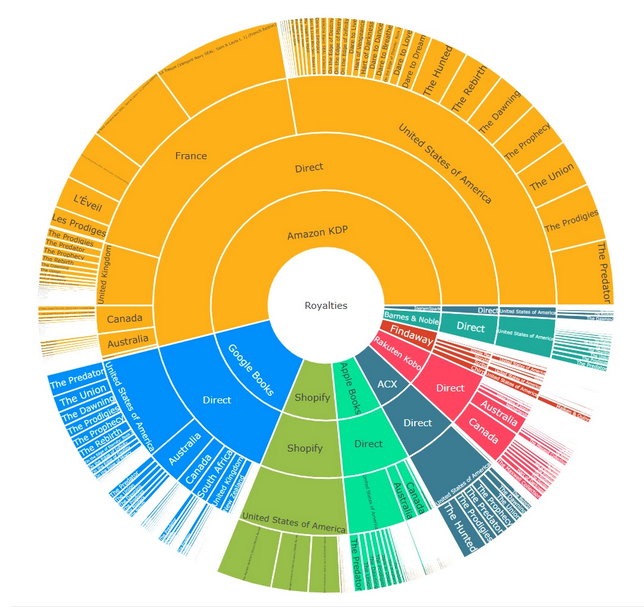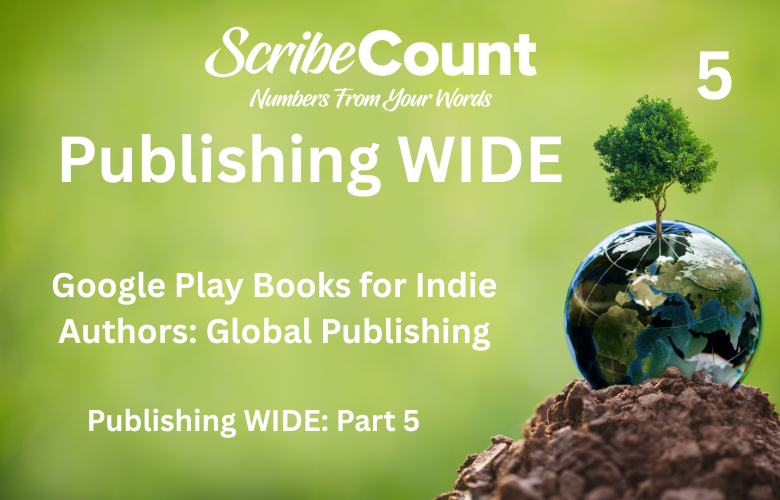Google Play Books for Indie Authors: Global Publishing and 70% Royalties
Google Play Books represents one of the largest and most underutilized platforms for indie authors aiming to go wide. With access to over 75 countries, native integration on billions of Android devices, and recent royalty enhancements, Google Play has become a critical part of any serious author’s global publishing strategy. When paired with real-time tracking tools like ScribeCount, authors gain deep insight into their reach, revenue, and performance across international markets.

The Evolution of Google Play Books for Authors
Google Play Books launched in 2010 as part of the Google Play Store ecosystem, making books available alongside apps, movies, and games. Initially geared toward traditional publishers, the program soon opened its doors to indie authors through the Google Play Partner Center. Although the early interface had limitations, Google has steadily improved functionality, adding support for preorders, better sales reporting, and tools for rights management.
Recent updates—especially the introduction of 70% royalties in over 60 countries—signal Google’s growing commitment to becoming a competitive option for independent publishers. With powerful backend analytics, native Android integration, and a user base spanning every continent, Google Play Books is uniquely positioned for authors ready to expand beyond Amazon.
Why Google Play Books Belongs in Your Wide Publishing Strategy
The wide publishing strategy allows authors to diversify income, protect against platform risk, and grow readership across the globe. Google Play is an ideal partner in this strategy because of its reach, Android-native accessibility, and flexible terms.
Billions of Android devices come preloaded with Google Play Books, making it the most widely available e-reading platform on Earth. Unlike Kindle Unlimited, which requires exclusivity, Google Play allows indie authors to sell simultaneously across other platforms like Kobo, Apple Books, Barnes & Noble, and even their own websites.
Additionally, Google’s search dominance increases discoverability. Books listed on Google Play Books are often indexed in Google Search results, giving authors an organic SEO boost. Readers can preview content, view author bios, and make purchases through a streamlined interface—all without requiring a third-party app.
What Google Play Books Offers Indie Authors
Publishing through Google Play Partner Center offers direct access to powerful features for authors.
Key offerings include:
Global reach across 75+ countries with localized pricing.
Native Android integration without the need for additional apps.
Preorder functionality for advanced marketing and visibility.
Optional DRM control to suit each author’s strategy.
Real-time sales analytics to track performance by region.
Direct interface with ScribeCount for unified reporting across all platforms.
Google's pricing system is list-price based, and discounts are controlled by the author. This prevents unwanted price-matching and helps maintain pricing integrity across channels.
Google Play’s Royalties and Terms (Updated)
Google Play Books now offers a 70% royalty rate in over 60 countries for authors who have accepted the most recent Terms of Service in the Partner Center. This upgrade applies to the book’s list price, even if Google applies a promotional discount.
For regions not included in the 70% agreement, authors continue to receive a 52% royalty rate. This change places Google Play in direct competition with KDP, Kobo, and Apple Books.
Royalties are paid monthly, typically within 60 days after the end of the sales month, via direct deposit. There are no exclusivity clauses, giving authors full flexibility to distribute their books elsewhere.
Google Play Books vs Amazon KDP: A Comparison
| Feature | Google Play Books | Amazon KDP |
|---|---|---|
| Royalty Rate | 70% (60+ countries), 52% elsewhere | 70% (2.99–9.99), 35% otherwise |
| Global Distribution | 75+ countries | 13 core marketplaces |
| File Format | ePub / PDF | ePub / .kpf |
| Preorder Capability | Yes | Yes (90 days max) |
| DRM Control | Optional | Mandatory (for Kindle) |
| Discounting Flexibility | Author-controlled | Limited, via KDP Select |
| Android Integration | Native | Requires Kindle app |
| Exclusivity Requirement | None | Yes (for KU) |
| Real-time Sales Reporting | Yes | Limited |
| ScribeCount Integration | Yes | Yes |
Pros and Cons of Using Google Play Books
Pros:
Google Play’s biggest advantage lies in its sheer reach—across devices, countries, and search visibility. The newly improved 70% royalty rate in many markets also brings it up to par with Apple Books and KDP within their pricing windows. The flexibility in pricing and DRM choices appeals to authors who want full control over their product.
Integration with Android devices and Google Search further amplifies discoverability and passive traffic. Plus, the ScribeCount integration makes it easy to monitor performance and trends across all major platforms.
Cons:
The Partner Center interface still lags slightly behind more mature platforms like KDP and Kobo in terms of design and usability. Some authors find the initial setup confusing, especially around currency conversion, tax forms, and rights territories. Additionally, the need to opt into new terms to access 70% royalties can be a hurdle for unaware users.
ScribeCount Integration with Google Play
If you're managing multiple platforms, ScribeCount becomes your secret weapon. It’s a tool that aggregates sales data from all your wide channels—including Google Play—into one unified dashboard. No more logging into dozens of sites a day just to see if you made any sales.
With ScribeCount, you can:
-
View sales from Apple, Amazon, Kobo, Google, and more in one place
-
Track daily, weekly, and monthly earnings
-
Break down revenue by book, series, and platform
-
Compare preorder performance across storefronts
-
Visualize long-term trends and spot seasonal shifts
ScribeCount helps turn your publishing data into real business intelligence—without overwhelming you with complexity. And yes, it includes real-time integration with Google Play so you’re never in the dark.
Since Google uses every color in the rainbow for their logo we had to pick one, so we went with Google Blue for your ScribeCount sunburst chart.

Conclusion: The Google Advantage for Indie Authors
Google Play Books has emerged as a viable and profitable publishing partner for indie authors seeking global reach, flexible pricing, and long-term growth. Its recent updates—including expanded 70% royalties and full ScribeCount integration—transform it from a secondary option to a powerful pillar of any wide publishing plan.
For authors ready to grow beyond Amazon, Google Play Books offers what few others can: worldwide access, transparent control, and a future-ready platform embedded into the world’s most used devices.

